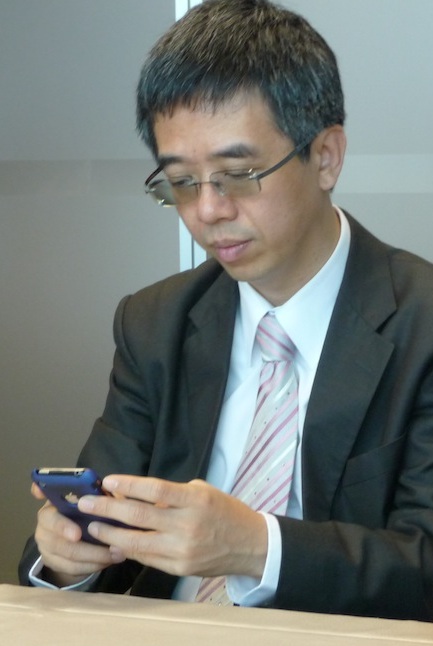Gigabyte: Laptops Will Die Off, Desktops Will Rise
Gigabyte says that iPhones and iPads are killing the notebook market, but this will pave the way for desktops to rule the land once again.
We participated in a small interview session with the management of Gigabyte's motherboard division to find out what sorts of challenges and opportunities the Taiwanese company sees for itself in the coming years. Present at the table was Henry Kao (vice president, motherboard business unit), Tony Liao (vice president, sales & marketing, North America), and Jackson Hsu (product manager, motherboard business unit).
Perhaps the most startling view was relayed by Kao. He said that the desktop market is very important for the next years for the company because of shifts happening in the portable space. Specifically, he forecasted the death of notebooks.
Kao pointed to the explosion of internet-enabled smartphone devices and the rising popularity of tablets. More than any other type of device, he named the iPhone and iPad as game changers for the mobile computing space.
Because of the internet capabilities of said devices, Kao said that users will eventually stop buying notebooks for their mobile computing needs. Instead, everything done away from the desk or even on the road will be through a smartphone or tablet.
"All of those devices, internet connected, will be better than ever," Kao said, adding his prediction that the shift away from notebooks to will take a three to five years. "100 percent replacement won't happen overnight."
What's interesting to note is that both Kao and Hsu walked into the Q&A with iPhones in their hands, and would periodically pick them up off the table to check something before setting them down again. Kao admitted that the problem with smartphones today is that typing into them is still a challenge, but once that gets solved through new features or on different form factors like the iPad, then the importance of the notebook will go down.
To predict the death of the notebook is a bold claim for anyone, but that sort of thinking is one that Gigabyte's motherboard division hopes for. If notebooks were to be replaced by smartphones and other MIDs, Gigabyte is banking on the users still wanting a desktop at the home or office.
Get Tom's Hardware's best news and in-depth reviews, straight to your inbox.
"Once those people have those mobile devices, people need performance desktop at home or the office," said Kao. "When iPad launched in the market, Gigabyte already supported iPad's charging requirements."
Besides just capability differences, Kao believes that users aren't ready to commit to cloud-based storage and applications.
"People still want to store their data in their personal systems, not in Google," he added.
With the current trend of notebook sales climbing on top of desktop sales, it'll be interesting to see if mobile devices can shift the tide. Gigabyte believes that the future will still rest on its motherboard business.
"People are still talking about the death of desktop, but they're still around," Kao said.
-
shovenose laptops suck. they break easily and are slow.Reply
however, laptops are way more eco-friendly because they use less power and use less material... -
littlec Says the company that barely sells jack in the notebook market. Sorry Gigabyte I love my motherboard you made me but I will never drop a notebook for a tablet or smartphone.Reply -
Stryter Productivity on a laptop is still miles above anything a smartphone or tablet can offer. I can't agree with Gigabyte on this one. Laptops will be around for years to come as they should be.Reply -
FloKid I don't have a laptop and probably will never going to get one. They are slow for most things I do on the desktop. Besides the size of the screens is small also. They break easy, and are not upgradable. Price is totally outrageous for the hardware they have in them. Mobile devices will still be in the market for the quick e-mail or what ever here and there, but I do think laptops will become the past soon.Reply -
JonathanDeane I sort of agree with what he says. But I don't think laptops will go away. They may drop some in popularity but companies will always need them and some people who simply do not have room in an apartment for a full sized computer will always buy them.Reply -
huron That is an interesting argument, but I'm not sure that typical workers need the power that a desktop offers.Reply
Many of us here at Toms use desktops regularly and love to building them. We see the importance of the power we build into them, but for many business users, even modern specs in a laptop are overkill for basic word processing, e-mail, spreadsheets, and internet browsing.
I love my desktop, and will continue to build more in the future, but I'm not convinced that if many things move to the cloud, that tablets and smartphones will not be enough for typical users.

